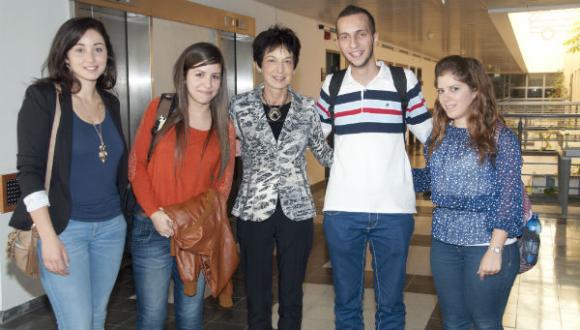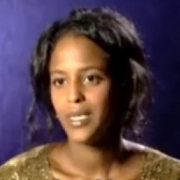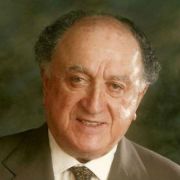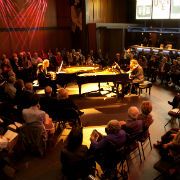Transforming the Arab Student Experience
On the cusp of the academic year, first-year dentistry student Ayal Mousa faced a dilemma: Attend a month-long preparatory program for new students from the Arab sector, or continue working to save money for the upcoming school year. Rami Tibi, social worker and coordinator of Arab students at the Ruth and Allen Ziegler Student Services Division, telephoned Mousa personally to help him to decide.
When Tibi enumerated the program offerings – including Hebrew for Arab speakers, preparatory science studies, dormitory housing, meeting fellow Arab students, and transportation between Tel Aviv and his Galilee village, all expenses paid – Mousa realized that, yes, he would have less money for the school year, but he would gain an invaluable foothold in university life.
The preparatory program attended by Mousa is part of “Sawa” – Kahanoff Arab Student Retention Initiative, founded by the Kahanoff Foundation and run by the Unit for Student Welfare of the Ziegler Student Services Division. A dual-pronged support and research program now in its second year of operation, the Kahanoff Initiative addresses the needs of the Arab student community at TAU to ensure that they successfully complete their education and join the ranks of the professional workforce in Israel.
There are currently 1,400 Arab undergraduate students at TAU, 500 of whom are in their first year of studies. They face unique challenges: the majority are away from home for an extended period for the first time; they study in Hebrew, not their mother tongue; they face deep cultural differences; many are under financial pressure; and they are on average two to three years younger than their Jewish counterparts.
Mutual dedication reaps results
The Initiative currently serves 300 first-year Arab students from selected study tracks with traditionally high Arab enrollment. The program provides ongoing mentorship, study groups, subsidized private tutoring and scholarships for students in need. It grants Arab students a social network, psychological and social services, and a dedicated staff and it is holding preliminary meetings with Israel’s largest firms to pave the way for prestigious internships for Arab students and alumni.
As part of its mandate to tailor its offerings to its target population, the Initiative conducts real-time research in the form of statistical analysis and student questionnaires. The Initiative is now upping its study session offerings in response to results showing that students with 100% attendance at the sessions raised their grades by 12 points on average and tripled their chances of achieving a passing grade. Marked improvement occurred in courses such as calculus, microeconomics, and especially cell biology, where students raised their grades by 20 points.
The role of mentors
Beyond the numbers, the Initiative fosters relationship-building and cross-cultural communication – whether via texting, Facebook, email, telephone, or face-to-face – between Arab students and mentors, and primarily Jewish teaching assistants and staff. This close contact helps staff stay abreast of student needs.
“Mentors and tutors have their fingers on the pulse of participants’ needs,” says Alberto Meschiany, Director of Psychological Services at the Ziegler Student Services Division. “They can encourage Arab students suffering from the cultural shock of coming from the village to the city, or from a lack of parental support regarding integrating into Jewish culture at an Israeli university, to turn to the University’s Psychological Services and Student Welfare Unit for support. We see an improvement in overall accomplishments when emotional worries are addressed,” he says.

Pictured: Arab students sitting on TAU's lawns
Mousa today is enthusiastic. Next year, he plans to join second-year student mentors Narmeen Massalha, Suzan Mansour, Nivin Jayusi to become a Kahanoff mentor himself. Besides achieving above-average grades in demanding courses, these three women attribute the confidence with which they approach their studies to the security of knowing that there is a dedicated staff supporting them. Their motivation as mentors is to give back what they received and create a successful start for new Arab students. Their experiences jive with the majority of program participants who resoundingly recommend it to their peers.
Shira Herzog, President of the Kahanoff Foundation, says, “We seek to create a program in which every participant is an agent for change and that will help individual students to thrive at the University, and become positive forces for transforming the Arab student experience on the whole.” Kahanoff Initiative alumni volunteering to mentor new students offer a perfect example of our vision.” Herzog adds that “Programs such as this stand or fail according to the dedication and talents of the staff. I can see why this program is succeeding.”
Kahanoff Mentors
“The study sessions freed me to ask questions that I did not feel comfortable asking in a large lecture hall filled with native Hebrew speakers. Techniques for organizing my schedule and test taking were invaluable. I am a mentor because I want to be part of this – it really works!” Narmeen Massalha, Economics and Management
“For me, becoming a mentor was a given. I had already begun to help others informally – whatever I figured out or was explained to me about navigating university life, I immediately shared with those who needed assistance.” Suzan Mansour, Life Sciences and Medicine
“Above and beyond the group study sessions and subsidized private tutoring – which helped me to achieve a grade 20 points above the average in cell biology – is knowing that a staff of devoted people stands behind me. It gives me confidence.” Nivin Jayusi, Biology
“The idea behind the tutoring sessions is to improve Arab student integration into University life on the whole. This goal is meaningful for Israeli society today.”
Daniel, Teaching Assistant
The Kahanoff Foundation was established in 1979 by Sydney Kahanoff, a Calgary businessman and philanthropist, and expanded by his wife, Fern Kahanoff. The foundation has initiated and supported innovative community development programs in Calgary and Israel, with a priority on access to education for Israel’s Arab minority. The foundation established the Ma’of Fellowships, which have greatly increased Arab faculty in Israeli universities and colleges, and which are now funded by the Council for Higher Education. The foundation wound down its activities this year. The foundation’s outgoing President and CEO, Shira Herzog, developed its emphasis on strategic, outcome-based philanthropy, and its approach to Israel funding over the past 30 years.






